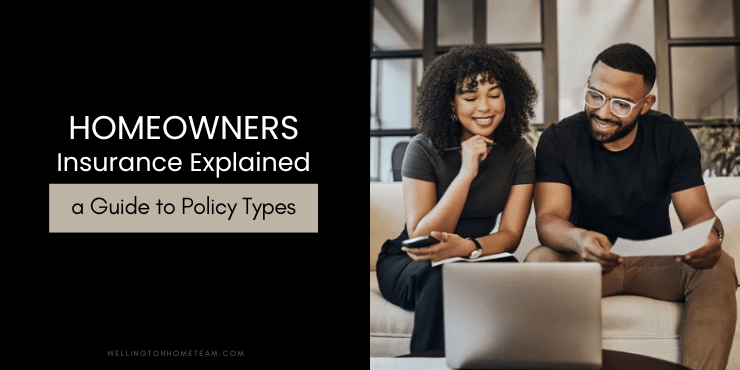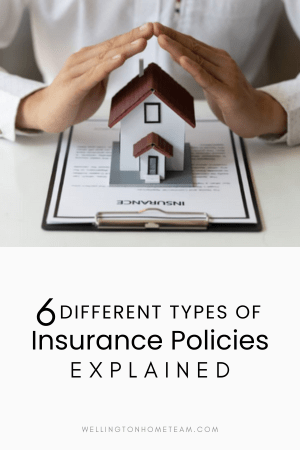Homeowners Insurance Explained | A Guide to Policy Types
When it comes to protecting your home, having the right insurance is crucial. Homeowners insurance can be complex, but understanding the different types of policies is essential. In this comprehensive guide, we’ll simplify the world of homeowners insurance and break down the various policy options, helping you make informed choices to safeguard your home and belongings.

What is Homeowners Insurance?
Homeowners insurance is a type of property insurance that provides financial protection for homeowners. It typically covers the insured property’s structure, personal belongings, and liability for accidents that occur on the property.
This insurance is designed to help homeowners recover financially from unforeseen events such as fires, theft, natural disasters, or personal injury claims made by others. It’s a crucial safeguard that offers peace of mind by mitigating the financial risks associated with owning a home.
What Type of Insurance Policy Do You Need?
There are several types of insurance policies to choose from and it’s important to purchase the right policy otherwise you may not have the proper coverage. The type of insurance policy you will need depends on your specific circumstances and what you want to protect. Let’s take a closer look at the 6 most popular types of insurance policies to choose from.
6 Types of Insurance Policies Explained
Special Form Insurance (HO-3)
Special Form Insurance (commonly known as HO-3) policies are tailored to single-family homes, townhouses, and other standalone residential properties. These comprehensive policies encompass coverage for both the physical structure of your dwelling and the personal property contained within its walls. If you own a traditional residential property, HO-3 insurance is a suitable choice for safeguarding your investment.
Investment Property (DP-3) Policy
Investment Property insurance, represented by the DP-3 policy, is specifically designed for residential properties that aren’t occupied by the owner. It serves as a protective shield for rental properties or those left vacant for extended periods of time. These policies are alternatively referred to as Dwelling Fire insurance policies, emphasizing their focus on safeguarding the structure itself.
 Condo Insurance (HO-6) Policy
Condo Insurance (HO-6) Policy
Condo Insurance, or HO-6 policy, is tailored exclusively for condominiums and cooperative housing units. Unlike traditional homeowners’ insurance, HO-6 policies concentrate on safeguarding the interior of individual condo units and the personal property owned by condo residents.
This approach recognizes the unique ownership structure of condos, where individuals typically own their unit’s interior while sharing responsibility for common areas with other residents.
Renters Insurance (HO-4) Policy
If you find yourself in the role of a tenant, whether in a house or apartment, Renters Insurance (HO-4 policy) becomes your invaluable ally.
This coverage extends protection to your personal belongings and offers liability coverage. Renters insurance is extremely affordable and proves indispensable in shielding your possessions from theft, fire, or other covered events, ensuring peace of mind during your lease.
Mobile Home Insurance (HO-7) Policy
Mobile Home Insurance, under the HO-7 policy category, is explicitly designed for mobile or manufactured homes. These policies cater to the unique needs of homeowners residing in such structures, providing coverage not only for the mobile home structure itself but also for the personal property contained within. By addressing the specific vulnerabilities and intricacies of mobile homes, HO-7 insurance offers comprehensive protection.
Flood Insurance Policy
The wrath of floods is an often unpredictable force that standard homeowners’ insurance policies typically exclude from their coverage. To guard against the devastating consequences of flooding, homeowners must consider purchasing a distinct Flood Insurance Policy.
This can be acquired either through the National Flood Insurance Program (NFIP) or a private insurer. With flood insurance, you can fortify your home against the ravages of water, ensuring financial security in the face of nature’s fury.
Benefits of Homeowners Insurance
There are many advantages of homeowners insurance, let’s take a closer look at what they are:
Property Protection
It covers the cost of repairing or rebuilding your home if it’s damaged or destroyed by things such as fire, vandalism, or natural disasters.
Personal Belongings Coverage
It provides reimbursement for the replacement or repair of personal possessions, including furniture, electronics, and clothing, in case of theft, damage, or loss.
 Liability Protection
Liability Protection
Homeowners insurance includes liability coverage, which can help pay for legal expenses if someone is injured on your property and you’re found responsible.
Additional Living Expenses
If your home becomes uninhabitable due to a covered event, your policy can cover the cost of temporary living arrangements, like hotel stays or rent.
Peace of Mind
It offers peace of mind by providing a financial safety net in the face of unexpected events, reducing the financial burden of rebuilding or replacing property.
Protection Against Lawsuits
It helps protect your assets by covering legal costs and settlements in the event you’re sued for injuries or damages that occur on your property.
Personal Property Worldwide
Some policies extend coverage to personal property even when it’s outside your home, such as items stolen from your car while traveling.
Customization
Homeowners can tailor their insurance policies to meet their specific needs, adding endorsements or riders for additional coverage, such as valuable items like jewelry or art.
Overall, homeowners insurance provides essential financial protection, ensuring that you and your property are well-guarded against various unforeseen circumstances.
10 Tips for Buying Homeowners Insurance
When it comes to purchasing homeowners insurance, a well-informed approach is imperative. Here are some tips for buying a homeowners insurance policy.
1. Assess Your Coverage Needs
Begin by evaluating the value of your home and its contents. This assessment will help you determine the appropriate coverage amount to adequately protect your assets.
2. Shop Around
Don’t settle for the first insurance quote you receive. Obtain multiple quotes from different insurers to compare prices and coverage options. Online tools and insurance brokers can simplify this process.
3. Understand Coverage Types
Familiarize yourself with the different types of coverage available, such as dwelling coverage, personal property coverage, liability coverage, and additional endorsements or riders. Tailor your policy to your specific needs.
 4. Consider Deductibles
4. Consider Deductibles
The deductible is the amount you pay out of pocket before your insurance kicks in. Choosing a higher deductible can lower your premium but means you’ll pay more in case of a claim. Find the right balance for your budget.
5. Review Policy Limits
Ensure that your coverage limits are sufficient to replace your home and possessions in case of a total loss. For valuable items like jewelry or art, consider adding specific endorsements to your policy.
6. Ask About Discounts
Inquire about available discounts, such as bundling your home and auto insurance, installing security systems, or having a home with safety features like smoke detectors and storm shutters.
7. Read the Fine Print
Carefully read and understand your policy’s terms, conditions, and exclusions. Be aware of any limitations, such as coverage for certain natural disasters or specific types of damage.
8. Assess Liability Coverage
Adequate liability coverage is crucial. Ensure your policy protects you in case someone is injured on your property and you’re held responsible.
9. Consider Replacement Cost vs. Actual Cash Value
Opt for replacement cost coverage, which pays to replace damaged or stolen items at their current market value, rather than actual cash value, which factors in depreciation.
10. Regularly Review and Update
As your circumstances change, periodically review and update your policy. Major life events like renovations, additions, or changes in the value of your belongings may require adjustments to your coverage.
By following these tips, you can make an informed decision when purchasing homeowners insurance, ensuring that you have the right coverage to protect your home and assets.
Final Thoughts
Selecting the right type of homeowner’s insurance policy is a vital step in safeguarding your most cherished investment—your home. Understanding the nuances and specialized coverage options offered by these policy types empowers you to make an informed decision tailored to your unique circumstances, providing you with peace of mind.
Please consider spreading the word and sharing; Homeowners Insurance Explained | A Guide to Policy Types
Learn all about the different types of homeowners insurance policies to make sure you have the proper protection for your home and belongings. #homeownersinsurance #insurancepolicyAbout the Author
Top Wellington Realtor, Michelle Gibson, wrote: “Homeowners Insurance Explained | A Guide to Policy Types”
Michelle has been specializing in residential real estate since 2001 throughout Wellington Florida and the surrounding area. Whether you’re looking to buy, sell or rent she will guide you through the entire real estate transaction. If you’re ready to put Michelle’s knowledge and expertise to work for you call or e-mail her today.
Areas of service include Wellington, Lake Worth, Royal Palm Beach, Boynton Beach, West Palm Beach, Loxahatchee, Greenacres, and more.

 Michelle Gibson of the Hansen Real Estate Group Inc is a full-time REALTOR who has been specializing in Wellington Florida real estate since 2001. This veteran of the real estate industry has expertise in technology, marketing, and social media.
Michelle Gibson of the Hansen Real Estate Group Inc is a full-time REALTOR who has been specializing in Wellington Florida real estate since 2001. This veteran of the real estate industry has expertise in technology, marketing, and social media.